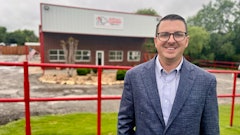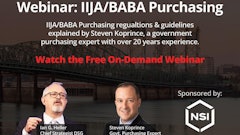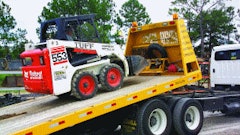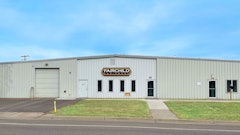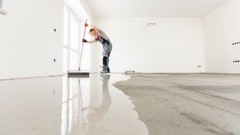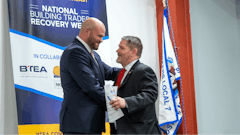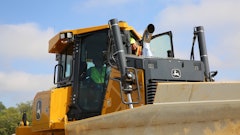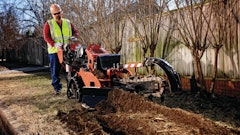
As a professional teaching institute, we strive to provide training in a realistic atmosphere so students get a feel for what they can expect in the real world. An example of this is a recent stamped concrete class in which we actually poured 28 cubic yards over the course of three days in addition to teaching sealing, form setting, shooting elevations and how to operate a Bobcat for grading. Teaching in this fashion is going to do one of two things:
1. It will show the realities of this physically demanding aspect of the market, possibly leaving students whooped with no desire of pursuing the business and potentially saving them thousands of dollars, or
2. They will actually become motivated and go back into their markets and succeed with their newfound education.
With a down economy and a highly competitive market, we realize that training needs to go beyond learning how much concrete to stamp or how to create beautiful and dazzling stain designs. In addition to a ton of practical hands-on training through a full day of stamping, staining or pouring countertops, we look at other ways we can help students. An example of this can be seen in something we recently implemented to our curriculum - finishing the day off with open round table discussions, shop talk if you will.
Round table discussions are a great way to wind down the day (especially with some cool beverages on hand) and discuss the business management side of running a decorative concrete company with such topics as "how to sell your work," "the next step after attending formal training," "the most practical way to market your business," "how to interact with a client who asks sensitive questions like, 'you're 15 percent higher than the other two contractors, why should I go with you?'," and "tile is cheaper so why would I choose concrete?"
These are important topics that need to be addressed in a controlled atmosphere without the worry of the concrete setting too fast or deciding how much color needs to be applied. During our sessions, we usually have three moderators at different stations with a variety of topics of which the students are unaware. The moderators pose the questions to the group as if they were the clients. Each individual comments on how he or she would address the situation or question.
This role-playing exercise is an effective way of learning from each other while having fun at the same time. You would be surprised at some of the interesting answers and creative ideas students have thought of as ways to convince a client there is no other option but to go with their company and concrete. Here are a few recent topics with actual answers from a few of our students:
Why should I choose stained concrete over tile?
- There are many things we can achieve with stained concrete that cannot be achieved with tile.
- We can take into consideration the size of the room and custom tailor our stained concrete designs by shrinking or enlarging the pattern to fit the dimensions of the room.
- With certain faux finishing techniques we can produce a floor that is entirely unique that does not mimic any other flooring material.
- There are no issues like delaminating tiles.
- There is no discontinued pattern, chipping out or discoloring grout.
You are 15 percent higher than the two other contractors. What makes you different?
- I take pride in my work as depicted in my portfolio.
- We have been professionally trained and use only the highest quality products.
- I asked my client what she was doing Thursday morning around 8:00 and she looked at me puzzled and asked why. I said I would like to buy you a cup of coffee at the local coffee house of which our company stained their floor over a year ago so you can see firsthand our company's capabilities.
- Here is my certificate(s) from my training.
- We take into consideration that we are working in your family's home and we will treat it as our own. Also, we have been doing this type of work for over eight years, and we are licensed and would love to provide a list of references for you to review or contact.
Are these applications something I can do on my own?
- Well, I'm not sure if you are aware of how many steps this process consists of. I then show them in my portfolio a pictorial of the steps which I'm sure my competitors aren't doing.
- We've been trained to use professional products and when put in the wrong hands could be hazardous and spell disaster.
- Some of the products we work with are reactive materials and you actually only get one chance. If you apply them in the wrong fashion, a drip or spill can become a permanent feature of your floor. It isn't as easy as one thinks.
I admire companies that invest in their employees' futures with continuing education whether the training is on software, sales and marketing, estimating, or decorative concrete applications. Round table discussions are a cost effective way of educating your employees that do not require a tremendous amount of time and can be easily implemented into your own company's business structure with topics including: "How can we increase production rates?" "How can we improve the quality of our work?" and "How should employees address clients' questions?"
With the winter months and most likely a few rain or snow days just around the corner, round table discussions can be an effective way of increasing your employees' knowledge base and showing them you care not only about improving the company but improving them as well.
Bob Harris is the founder and president of the Decorative Concrete Institute, Temple, Ga., which provides hands-on training in architectural concrete. He has personally placed or supervised the placement of more than 3 million square feet of decorative concrete and is the author of a best-selling series of decorative concrete books and DVDs. For more information, call (877) DCI-8080 or visit www.decorativeconcreteinstitute.com.












